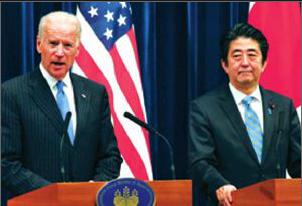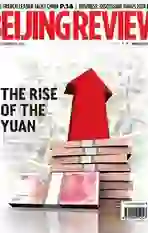A Tripartite Tilt
2014-02-25ByAnGang
By+An+Gang

When Japanese Prime Minister Shinzo Abe ascended the steps of the Yasukuni Shrine in late December last year, he knew what it would mean for Japans relations with China and South Korea. What may have come as a surprise was the damage his move would cause to the U.S.-Japan alliance.
A crushing blow
The Yasukuni Shrine is a controversial Tokyo shrine that honors Japanese war dead and their family members. Also enshrined there are 14 Class-A war criminals from World War II including wartime Prime Minister Hideki Tojo as well as 2,000 others convicted of war crimes by the International Military Tribunal for the Far East.
After Abes visit to the shrine, China lodged a strong protest. A Foreign Ministry spokesman remarked that Abe has closed the door of dialogue with Chinese leaders by his own hand.
Abes shrine visit was the Asian equivalent of honoring the Nazis. Chinese Ambassador to Japan Cheng Yonghua said Abe crossed a red line and dealt a heavy blow to bilateral relations.
Ties between China and Japan have fallen to their lowest point since they normalized diplomatic relations in 1972. For the two countries, there is little space for either to retreat from their stances. They may have even entered into a new cold war phase, as did Japan and South Korea. Though Abe expressed publicly that he is willing to have dialogue unconditionally with Chinese and South Korean leaders after the shrine visit, it comes across to many in Asia as an empty diplomatic gesture, failing to generate a positive response from Beijing and Seoul.
In fact, territorial disputes and historical problems are not the whole cause of the current strained relationship between China and Japan. To a great extent, the deterioration of bilateral relations stems from the deepening of strategic conflicts between the two. In recent years, with the rapid rise of China and the advancing of Pyongyangs nuclear program, Japan, which has been badly hit by economic stagnation, believes that its neighboring security environment has significantly worsened. As a result, it has turned sharply right both politically and socially.
After Abe took power for the second time in December 2012, he began taking advantage of this rightist bent by catering to Japans nationalism in order to solidify his domestic support. In January 2013, an editorial of U.S.-based The New York Times defined Abe as a “conservative nationalist” and said that his policy is bound to increase tension in East Asia.endprint
A three-way game
From a geo-strategic perspective, the confrontation between China and Japan is part of the trilateral game among China, Japan and the United States.
The United States is an important element to the landscape of East Asia and the regional security situation. The main purpose of U.S. President Barack Obamas “pivot to Asia” strategy initiated in his first term is to cope with the rise of China. The United States on the one hand has to enhance cooperation with China as the latters international influence continues to rise; on the other hand, it has actively intensified military deployment in the Asia Pacific and strengthened ties with regional allies, including Japan, to maintain its deterrence.
But in practice, the Obama administration has to face domestic bottlenecks including an economic downturn and budget crises as well as lingering global hotspot issues. Therefore, it cannot fully achieve the original objectives of its rebalancing strategy, and it is also difficult to fully implement the security commitments to its allies.
Tokyo, for its part, is laden with anxiety about Washingtons strategic dilemma in Asia. A Japanese official told Philip Stephens, Associate Editor of British newspaper Financial Times, that Abe noticed that the United States failed to back the Philippines in its South China Sea dispute with Beijing, wherein the Manila government was “left high and dry.” Japan would not make the same mistake, choosing instead to repel “Chinese incursions” with its own naval forces, Stephens wrote. Abe would also loosen the constitutional constraints on Japans military budget.
Japans Tokyo Shimbun newspaper recently said in an editorial that the Obama administrations acceptance of Chinas proposal to build a new type of relationship between major powers is tantamount to Washingtons announcement of changing its original arrangement of the AsiaPacific strategy and establishing a diplomatic and security policy with Sino-U.S. relations as the core. Under the circumstances, if Japan continues clinging to the United States, it will surely be thrown into a state of embarrassment. It is thus necessary for Japan to pursue an independent foreign policy.
Many Japanese media attribute Japans move to restore national strength and power in the changing East Asia to the shelter of the U.S.-Japan alliance, adding that the biggest practical problem facing Japan is how to survive between the two great powers of the United States and China.endprint
